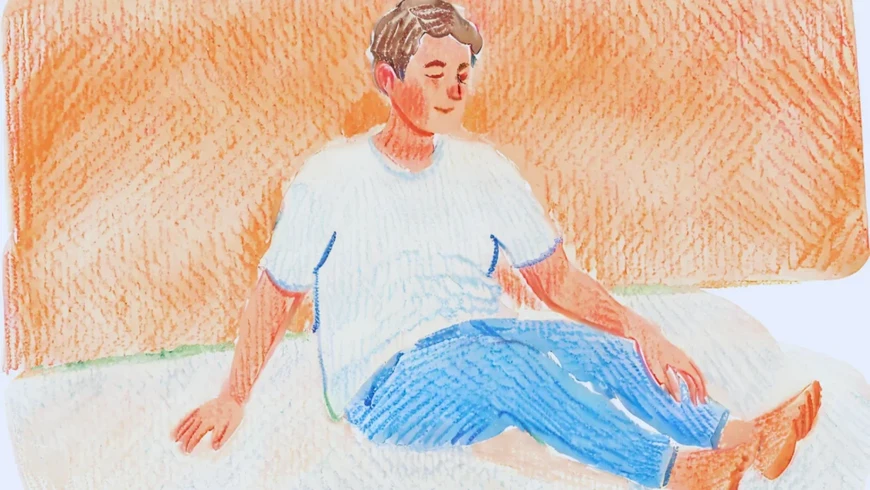Table of Contents
Meditative Contemplation is a common practice in many parts of the world. But, when it comes to practicing it, many differences arise. Though the practice is one, it has different effects on different people. Let’s look at the 7 most common questions with regards to Meditative Contemplation and its application.
A must know for All-Levels of Meditators
How can I know if my Meditative Contemplation is right
1.Questioner: I have meditated several times. But, most often I find an inconsistency in the way I am meditating. Sometimes I feel that, Yes I am meditating correctly. But at other times I strongly feel that I have missed out on something crucial. So, how do I know if I’m meditating correctly?
Answer:
See, meditation is a practice to feel energized. When there is a feeling that something is going wrong, it means that there is a discomfort that is hindering relaxation. So, see if you can resonate with any of these symptoms.

If you are Meditation is happening incorrectly:
- You will feel as if a huge amount of energy has been sucked out of your system. You will feel that there is vacuum which is preventing you from feeling that same energy with which you begun the practice.
- There will be discomfort throughout the Meditative Contemplation process. With passing days the overall disturbance level will increase, leaving your overall well-being threatened.
- Your contentment level with respect to your Sadhana Meditative Contemplation will reduce. You will feel less inclined to meditate next time you sit.
- The more you meditate correctly, the more you shall get interested in matters of spirit. Your tiredness and sluggishness will find no room.
- Also, you shall have good, deep sleep at night, if you are meditating well.
Sleep and Meditation
2.Questioner: I am getting a good night sleep. However, I tend to sleep while meditating. So, is it okay to sleep during Meditative Contemplation?
Answer:

- If you are new to Meditative Contemplation, sleeping is a common experience for many. However, with time and practice, sleep should reduce.
- If sleep is recurring time and again, one should consciously try to correctly meditate with your spine erect. This will prevent you from falling asleep. Fix a routine and prepare your mind before you sit down to meditate. By doing so, you are notifying your body system to remain active while you meditate.
- Sleep also reflects the inherent state of sloth within our system.
- The more you practice Meditative Contemplation, in the right manner, slowly the tendency to sleep shall also vanish because you are graduating from Tamas (sloth) to Sattva (healthy state of being).
- The transition from the mode of ignorance to a complete state of wellbeing does not happen overnight. So, it is needed that one does not take a break from Meditative Contemplation.
- If we take an unusual break from Meditative Contemplation, the body next time will take longer to get aligned to the practice. Sleep can be more severe after you take a long break from Meditative Contemplation. Hence, consistency and patience is the key to eradicate sleep during meditation.
Insomnia and Meditative Contemplation

3.Questioner: You said, that deep sleep is a sign of correct Meditative Contemplation. But, what if a person has been suffering from Insomnia? Can meditation be of some help to treat Insomnia?
Answer:
- Meditation may be able treat chronic conditions of insomnia.
- However, it cannot be the sole tool to treat medical conditions.
- Consulting a qualified physician is mandatory under these circumstances.
- Meditative Contemplation can support the treatment and accelerate the recovery of the patient.
- All said and done, medical advice is indispensable.
Meditation and Unusual Experiences

4.Questioner: I have heard people describing unusual events following their Meditative Contemplation practice. Few people drop out of meditation due to fear. So, Can meditation ever be dangerous?
Answer:
- See, Meditative Contemplation can be dangerous if done alone.
- Just like medicines are meant to cure, Meditative Contemplation also cures. But, if medicines aren’t taken under medical supervision or prescription and just because your friend recommends it to heal a certain problem it can be life-threatening. Similarly every body is different. People are not sensitive enough or to be more accurate they are not subtle enough to recognize what is good for them and what not. So, there is a need for a mentor, a guru who has mastered Yoga and meditation. A qualified Guru can walk you through the steps and ensure that no physical damage occurs.
- If you are combining Meditative Contemplation with certain forms of Pranayama (Breathing exercises), without expert guidance, it can prove to disturb once mental balance.
- If one practices Meditative Contemplation , combining it with concentrating on external objects like a point or candle flame (also known as Trataka), it can get disturbing. They can have adverse effects. So, these severe practices should only be done under a person who has graduated to the point of Self-Realization through the Yogic practices.
- Also, meditating on certain holy symbols like Trident by accepting it as the chief weapon of Lord Shiva without a guru can have a damaging impact on the mind. One may get disturbing visions and experiences which will disengage one from exploring the possibilities that life has to offer. One might get into a depressing state and might require to channelize one’s energies under the expertise of a Guru who has done Shiva Sadhana.
- A common word of caution is that all Meditation practices should be performed under supervision only.
Test your Alignment with the Spiritual Subject Matter (only 7-8 Questions)
The scores generated in this Quiz are relative. There are no right or wrong answers. A percentage towards 100 indicates that you are more aligned to the overall subject matter.
Thoughts and Meditation

5.Questioner: I hear some people say Meditative Contemplation means no-mindness. People say, no thoughts. But, I sometimes find that thoughts are inevitable. There isn’t a proven method, I found that can help me navigate through my thought world and reach a realm of no-mindness. So, is it okay if I think during Meditative Contemplation? Is there anything wrong in that?
Answer:
- See, if you are thinking, you are not meditating.
- Meditative Contemplation itself means controlling thought to such an extent that there remain no scope for thought.
- You say there isn’t a proven method simply because you have no experience of it.
- Normally, thought happens because of our compulsive thinking patterns. The mind is on its own trip, whether we want it to go somewhere or not. More often than not, our own thoughts are not under our control.
- Thoughts go out of control, you may feel it is inevitable because the inner instrument has not be cleaned and maintained.
- Our mind is full of erroneous notions and our mind is trying to get answers to questions which are beyond its purview.
Focused Meditative Contemplation
Questioner continues: Can’t my mind answer the questions I am trying to find. How do I know whether my analysis is right or wrong?

- No, the mind never gets a single answer for a question. I shall explain this through an example.
- For example: somebody said something to us. So, our mind throws on us, hundreds of reasons to get to the right answer. Isn’t the variety huge? It is a sign of confusion. So many thoughts. Isn’t it?
- However, the fact remains, that the mind may be able to conjecture through its screen of faulty notions, but we can never be sure whether it was the right answer.
- Doubting its own answers the mind goes round in endless circles. Finally, it gets tired and puts us to sleep. The next day, the cycle continues.
- This means that the mind, really has no answers.
- But, meditation does have an answer. So, what is meditation? Meditation is integrating the energies of our own subtle life-forces. Just like, when we focus the sun’s rays through a lens enough, it burns things, Meditative Contemplation puts an end to all of mind’s created notions.
- In fact, meditation stops mind chattering, if your effort is sincere and the method is accurate. As a result, the mind gets cleansed and there shall be no unnecessary rut for trying to get answers for things which are better left unanswered.
- So, Meditative Contemplation process kills unnecessary thoughts and make the mind our slave. But, to be honest more than 95% of the world are slaves to the mind.
Meditation and Crying

6.Questioner: Guruji, sometimes I close my eyes and I fell such great energy within my body. I don’t know what it is. But, it does not cause any pain in the sense of physical pain. It can’t be detected through equipment. It is more to do with my feelings. This never happened before I took up Meditative Contemplation . Many times, the feeling is so intense that I end up crying. So, I would like to know as to why I cry during meditation?
Answer:
- This is a common phenomenon during Meditative Contemplation.
- If we are dedicatedly following a meditation routine, we have to understand that we are focusing our bodily, emotional and life-energies inward. We are trying to impinge into the deeper layers of consciousness.
- What we are from inside gets reflected as the external world. So, as our Meditative Contemplation practices become subtler and deeper, many layers of our subconscious and unconscious layers of mind start to open up. They get exposed, one by one.
- As these dimensions open up, our external system may not be particularly ready for the outbursts of our feelings buried inside the crevices of our mind and heart.
- It is this unraveling of the inner instrument that presents itself as fits of laughter, crying or even fear.
- It may appear odd to others. But, if we understand the science of how Meditative Contemplation works and clean our inner instrument, there is nothing strange about these emotional outbursts.
- In conclusion, crying, laughter, anxiety and fear are progressive sign. It simply indicates that your mind-body and heart are getting cleansed. There are so many prior life impressions as well as those of this life. It takes time. So, nothing to worry. Just practice under the guidance of a master.
Who should and who should not do Meditation

7.Questioner: I am confronted with a lot of body aches, which makes meditation at times impossible while sitting on the ground. When I see people meditating with such concentration and austerity, I feel guilty. I try meditating as they do. But, I only meet up with failure. So, I wanted to ask whether I can meditate sitting on a chair or on bed?
Answer:
- See, it is important to understand the goal of meditation before we can answer this question. Meditation is a tool to end the self-created confusions in the mind.
- How you sit while meditating or how you look while meditating, does not gauge your sincerity in any manner.
- A person who seems to close his eyes, might not be meditating at all. While the one who seems to sit is a comfortable seat might be more sincere in his/her endeavor.
- Meditation comes from intention. Actions are important to support Meditative Contemplation. But, it cannot be the only criterion to measure your sincerity.
- We can sit anywhere, if this goal is deeply imprinted in us that meditation is a purificatory process.
- For those of you who do not have any apparent physical problems and those who are young, beginning their meditation journey, it is highly recommended that one takes up meditation as an austerity.
- For such individuals, sitting on the ground is a best way to start. You should sit on a cloth or asana.
- On the other hand, for those who have body aches, knee pain, joint pain, etc Meditative Contemplation can be done on an elevated platform where not much strain is felt on the effected body area.
- For such individuals, sitting on a chair or on a bed is permitted.
You display your love by reading this valuable material. So kindly read and consider financially supporting us to keep our efforts going with renewed vigor! Supporters in India can donate via Razorpay while those abroad can use PayPal!




